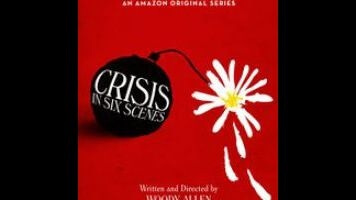Kay (Elaine May) is a marriage counselor, a fact that has barely come into play for the plot of Crisis In Six Scenes. I guess there’s a faint ring of irony in that she’s a counselor whose husband complains incessantly, but even that feels like a stretch, irony-wise. Mostly, her occupation has served to provide the show with some funny scenes, like one in the fifth episode where Kay sees that she has accidentally unleashed a hooking price war in a married couple after advising that the prostitute-loving husband start paying his wife for sex, rather than going elsewhere.
Maybe there’s a little thematic unity between that scene and the rest of the episode, wherein Sid and Kay get a little more involved with their houseguest Lenny’s radical connections, in that they are kinda-sorta spicing up their marriage by kinda-sorta flouting the law and putting themselves on the line. Their jeopardy is real, of course, in the sense that they really are sent to pick up a briefcase of cash and deliver it to a phonebooth. But here’s where maybe Allen’s dopey low-budget-Cold-War-thriller vision of how a radical organization operates actually works in the material’s favor: Sid and Kay don’t know what to make of this world, either, and with Allen in charge of the gritty realism, it doesn’t really land as such.
And while Sid kvetches plentifully, in the scene where he sets off to drop the briefcase his protestations feel more affectionate (if still possessed by professional “nervous fellah” Allen’s trademark nervousness) – he seems for a moment almost tickled, however briefly, to be doing this with Kay, even though she cajoled/tricked him into it. As is often the case with Allen’s depictions of marriage, you get the feeling the wife probably has to trick the husband into actually kind of having fun semi-regularly.
While that assumption comes from watching other Woody Allen movies depicting marriage, it’s hard to classify that as one of his chief subjects over the years. For all of Allen’s on-screen marriages, he doesn’t often really sink into them; if anything, they seem to be part of his antiquated notion that marriage is how you show a couple in a committed relationship – that an audience won’t believe a relationship really means anything to the characters if they aren’t married. There’s no sense of ceremony to, say, Larry David marrying Evan Rachel Wood in Whatever Works; it’s just meant to show that their affair, however ill-advised, is basically on the up and up. I guess it makes sense, then, that the movie marriages Allen seems to write better are the ones that pick up with the characters in a long haul, like Manhattan Murder Mystery. He’s become a decent chronicler of the elderly in spite of himself.
The Sid/Kay marriage isn’t depicted with much nuance, wit, or insight, but it is sweetly likable, and a far cry from the curdled tone of Allen’s (frequently excellent) ’90s relationship movies, or even the shoulder-shruggy attitude of his fate-fixated ’00s features (recall that the movie I just mentioned was actually called Whatever Works). It helps that this episode actually moves the characters along, albeit mostly just from the doctor’s office to some alleys. There are also laughs from Sid’s hypochondria: He complains of a chronic “awareness of [his] right thumb” and asserts that “maybe [the doctor] can’t find it, but I have an ulcer.” In other words, Allen does his thing, or at least the octogenarian version of his thing.
Poor Miley Cyrus is afforded no such a showcase for this go-round; this crucial and bungled money dropoff happens on her behalf, but without her actually around. Presumably she’ll be more present in the next and final episode, but at this point I’m hoping she signs on for another Allen project if only because I think she’s capable of better (Allen, meanwhile, is definitely capable of better). I’m not sure if there was a six-episode anthology-style series that could have been assembled from Elaine May straight-facedly counseling ridiculous couples, Woody Allen describing ridiculous ailments, and Miley Cyrus popping up to call him old, but at this point, funny as this episode is, that is kind of what I’m wishing we got.
Stray observations:
- This episode’s ghosts of Woody Allen movies pasts: Well, the therapy scene goes into detail about prostitution, which Allen briefly seemed obsessed with in the second half of the ’90s, with Mighty Aphrodite and Deconstructing Harry. Sid’s hypochondria recalls Annie Hall (among others); reluctantly rediscovering his relationship through danger has hinst of Manhattan Murder Mystery again, as mentioned. And the bumbling criminality brings to mind both the Take The Money And Run of Allen’s youth and the Small Time Crooks of his dotage. What do all of those movies have in common? They’re all a lot better than this one is, although maybe the 85-minute version of Crisis could’ve been on par with Crooks.
- Do all of these better movies make this episode more derivative? Actually, not really. As I think I mentioned before, all of Allen’s work tends to recall other things he’s done; at least this episode recalls good movies.
- One more to go! You must all be on the edge of your seats watching along with me! By which I mean, the hardcore Woody Allen fans finished up a week ago and everyone else is just wondering why this space can’t be episode-by-episode TV Club Classic reviews of Jake And The Fatman.

 Keep scrolling for more great stories.
Keep scrolling for more great stories.
